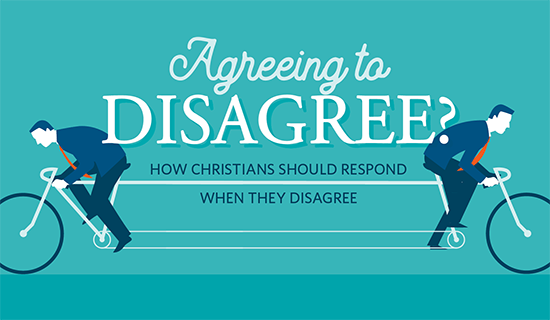
October-
November 2018
Moving Forward
------------------
|






How Christians should respond when they disagree...
Agreeing to Disagree?
By Matthew Steven Bracey
Have you ever experienced a church or denominational conflict? You know the scene:
a group has split into two, perhaps three, factions, each claiming the moral high ground. We might roll our eyes when this happens, but are factions ever justified?
In a Relevant Magazine article, Brett McCracken points to six issues that divide Christians today: 1) homosexuality; 2) universalism; 3) politics; 4) evolution; 5) women in ministry; and 6) the Internet. Clearly, some of these topics raise more questions than others.
One example is homosexuality. The Christian blogosphere erupted when Brandon and Jen Hatmaker, former hosts of the HGTV reality series Your Big Family Renovation, suggested God could bless same-sex unions. Brandon later tweeted, “Dear fellow Believer: Stop accusing other Christians of abandoning truth just because you disagree on a single topic. It’s so condescending.”
At the same time, not all Christian disagreements rise to that level, like church splits over the color of the carpet. Indeed, disagreements within the church run the gamut. So, should Christians simply “agree to disagree” on topics like homosexuality, or should they stand by their convictions? On the other hand, when can we legitimately disagree? I offer three principles:
-
We Must Maintain Christian Character. Whatever the nature of our disagreements, we should always maintain Christian character. Regrettably, disagreements among Christians, and even between believers and unbelievers, can become nasty, bitter affairs. We’ll say we’re speaking out of love, but our words, tones, and actions say the opposite. We don’t think about how others will interpret us. We just react, often in a manner that’s rash and mean, even unchristian.
That’s not the way of the cross. Jesus came full of both grace and truth (John 1:14). While disagreement can be appropriate, it must be measured. We should stand for truth, but that’s never an excuse to be ungracious or unkind to anyone. My mamaw’s wise counsel, “Don’t be ugly,” is a good rule of thumb.
-
We Can’t Simply “Agree to Disagree” When
Orthodoxy Is at Stake. The Bible is our sufficient, infallible, inerrant rule and guide in those matters of which it testifies. Thus we can’t simply “agree to disagree” when doing so would result in disobeying the clear teachings of Scripture. For example, the Apostle Paul emphatically drew a line in the sand over works-based salvation (Galatians 2-3); the Apostle John did the same over Jesus’ literal incarnation (2 John). Other examples might include the fundamentals of the faith we see in Scripture. What happens, though, when people who agree on the authority of Scripture disagree over its interpretation? We see this with the question of homosexuality, for instance; people on both sides of the debate appeal to the same passages. One reason this happens is because some interpreters, in the past half-century or so, have increasingly applied a postmodern hermeneutic to familiar biblical passages and disregarded historic interpretations.
When this occurs, we must appeal to the millennia-old tradition of Christian orthodoxy. Al Mohler, president of The Southern Baptist Theological Seminary, explains that the Church through space and time forms the interpretive community of Scripture. Individuals aren’t the final arbiters of right interpretation.
Whatever the trends of culture’s morality, the ultimate authority for the Church is the Bible. The Church universal offers a more sure interpretation of that authority in matters of faith and morals than the changing whims of culture.
-
When Orthodoxy Isn’t at Stake, We Should Remain United Even Amidst Disagreement. Not all disagreements are questions of orthodoxy, though. Whereas some disagreements separate believers along denominational lines, others may not. What should we think about this? Do we simply “agree to disagree,” or is there another way forward?
Disagreement Between Denominations
We shouldn’t simply “agree to disagree” when legitimate doctrinal differences arise. The reason? We all care deeply about truth; we’re not doctrinal minimalists. “Natural divisions occur when people disagree about significant matters,” explains J. Matthew Pinson. “That doesn’t mean they have to be divisive or uncharitable in the negative sense.”
Denominationalism, then, isn’t necessarily bad. Rather, it’s a testament to people earnestly, prayerfully seeking truth. In addition, denominationalism doesn’t need to amount to disunity. Believers on different sides of denominational lines can love and respect one another, even amidst their disagreements, being united in the gospel and in orthodoxy.
Disagreements Within Denominations
Other times, disagreements occur within a denomination. Denominations are usually composed of people with very different visions for how their agencies, ministries, and churches should function. What should we do when this occurs? First, as stated previously, we must maintain Christian character.
Second, denominational disputes that don’t violate orthodoxy shouldn’t result in disunity or even discord. One of Scripture’s foremost themes is unity. We see it, for example, in Jesus and Paul: Jesus prayed for unity (John 17:11-12, 20-23). Paul instructed it (Ephesians 4:1-6; 1 Thessalonians 5:12-13, 23-24). In 1 Corinthians, Paul asked whether Christ has been divided (1:13), and in Romans, why we view our Christian brothers with contempt (14:10). God’s Kingdom, he explained, is righteousness and peace. Disagreements over the days of the week, dietary restrictions, or other such topics shouldn’t result in tearing one another down but rather in building one another up (Romans 14:5-6, 17-20).
Third, being unified doesn’t mean we can’t discuss our differences. Sometimes, cries for unity are attempts to shut down dialogue. We shouldn’t do that. We should bring Christian truth to bear on all of life. Unity doesn’t mean quieting people with strong opinions and legitimate concerns. Instead, it means pursuing creative ways to talk about our differences in a manner that’s charitable and productive.
Unbridled transparency (especially on social media!) is often not helpful, but an imposter from modernity’s creed—wreaking havoc within the church. On the other hand, discretionary honesty, coupled with love and wisdom, is biblical and fruitful.
How, then, can we stand for unity while being honest about our disagreements? I would not suggest articulating that your position represents the “stronger” brother, and that your opponent’s represents the “weaker.” Even if it’s true, it is not helpful when both parties align themselves with the stronger brother (Romans 14; 1 Corinthians 8-9). It creates a major impasse and
discourages reconciliation.
Instead, especially in the face of disagreement, we should encourage one another. Christian love is more than rhetoric; it’s action, prayer, and support. Rather than dredging up old unconstructive criticisms for the sake of stirring the pot, let’s work toward worthwhile solutions. To the extent we can, let’s contribute to one another’s churches, ministries, and agencies. Let’s extend those olive branches.
To do this, we need to make friends with people who aren’t in our denominational tribes. The fact that we have tribes is a travesty. Let’s abandon our silos, move beyond our echo chambers, sit down over coffee or a meal, and get to know one another. Constructive Christian dialogue assumes a different tone, and sometimes produces different results, when those with whom we disagree aren’t straw men we’ve built, but real people who are our friends and who, we realize, love the denomination as much as we do.
Perhaps this means imaginatively meeting in the middle somehow. That said, we should respond in good faith when those with whom we disagree define the middle differently from the way we do. Whatever we do, let’s build up one another and our denomination. The simple fact is that denominations can accomplish for God’s Kingdom what individual churches often cannot, especially in the areas of education, missions, and publishing, among others. Let’s work, then, to protect and strengthen them.
Conclusion
Orthodoxy is non-negotiable. Denominational disputes, though, which aren’t questions of orthodoxy, are another matter. Let’s emphasize what we have in common, and discuss those things we don’t in a way that unifies. We’re not lone rangers, and we’re not grand inquisitors. We’re the singular Body of Christ. We’re iron sharpening iron (Proverbs 27:17).
Even if we were to split according to our differences, our divisions won’t last. Eventually, we’ll come together. We’re a family, and we’ll spend eternity together. Even then, we might not agree on everything: “I think the apple is the best fruit.” “Are you crazy? It’s definitely the banana!” But we’ll unite as the Body of Christ.
So why not grow in sanctification sooner rather than later? Whether we’re on the denominational right or
the denominational left or somewhere in between, let’s learn to live together now as Christian brothers and sisters. We can remain committed to our positions, since truth matters. But, taking to heart the principles outlined, let’s seek unity and lift one another up amidst our disagreement.
About the Writer: Matthew Steven Bracey works at Welch College as Vice Provost. He holds degrees from Cumberland School of Law (J.D.), Beeson Divinity School (M.T.S.), and Welch College (B.A.), and he’s presently a Ph.D. candidate at Southern Baptist Theological Seminary.
|
|

